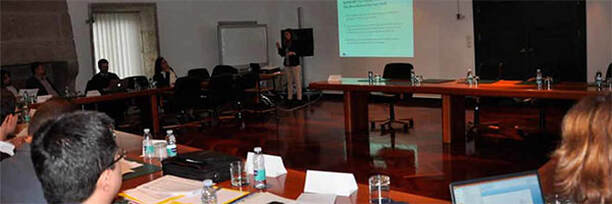R2Pris kick-off meeting joins counter terrorism and security specialists
Counter terrorism and security specialists from Norway, Romania, Turkey, Portugal, and the USA joined at the BSAFE LAB in Beira Interior University (Covilhã, Portugal) on the 3rd and 4th November 2015 in the framework of the kick-off meeting of the R2Pris project.
Radicalisation Prevention in Prisons (R2pris) project seeks to reduce radicalisation and extremism inside prisons by enhancing the competences of frontline staff (correctional officers, educational staff and psychologists, social workers) to identify, report and interpret signals of radicalisation and respond appropriately. Bringing together international experts in the field of radicalisation and national prison administrations, R2pris project aims to offer an innovative training programme for prison staff on how to recognise and prevent the process of radicalisation inside prisons.
Main objectives:
– the difference between conversion, radicalisation and moving to extremist views (terminology);
– the pathways and levels of radicalisation, role in the network;
– recruitment tactics employed within the prison environment; and e) indicators on how to identify vulnerable people at risk of radicalisation;
Radicalisation Prevention in Prisons (R2pris) project seeks to reduce radicalisation and extremism inside prisons by enhancing the competences of frontline staff (correctional officers, educational staff and psychologists, social workers) to identify, report and interpret signals of radicalisation and respond appropriately. Bringing together international experts in the field of radicalisation and national prison administrations, R2pris project aims to offer an innovative training programme for prison staff on how to recognise and prevent the process of radicalisation inside prisons.
Main objectives:
- Create awareness on the broad picture of terrorism, the mind set and narratives used by understanding:
– the difference between conversion, radicalisation and moving to extremist views (terminology);
– the pathways and levels of radicalisation, role in the network;
– recruitment tactics employed within the prison environment; and e) indicators on how to identify vulnerable people at risk of radicalisation;
- Develop the tools and instruments for prison administration and line-level staff to recognize signs of radicalisation at an early stage within their specific facility;
- Provide common, consistent and effective instrumentR2s to help staff report their observations to the appropriate intelligence staff;
- Provide model procedures for intelligence staff to vet the data they receive from prison staff and to appropriately interpret it;
- Establish a series of training programmes and tools for all staff within a prison to respond appropriately to potential vulnerable individuals at risk of radicalisation.
- An innovative methodological framework for analysing deradicalisation and prevention of radicalisation strategies within prison;
- A radicalization screening tool, with respective assessment materials and guidelines for prison administration and line-level staff to recognize signs of radicalisation at an early stage within their specific facility. The tool will be adapted to the specific legal and cultural context of the countries involved in the project;
- A training course for all staff within a prison on how to detect and respond appropriately to potential vulnerable individuals at risk of radicalisation (an e-learning course and a train the trainer course)
- Five national seminars with at least 15 national stakeholders/experts and 15 international participants each;
- An international seminar, with the participation of at least 30 transnational experts/stakeholders and 15 national participants.
- BSAFE LAB/UBI University, Portugal
- IPS_Innovative Prison Systems, Portugal
- National Prison Administration (NAP), Romania
- Belgian Prison Service, Belgium

